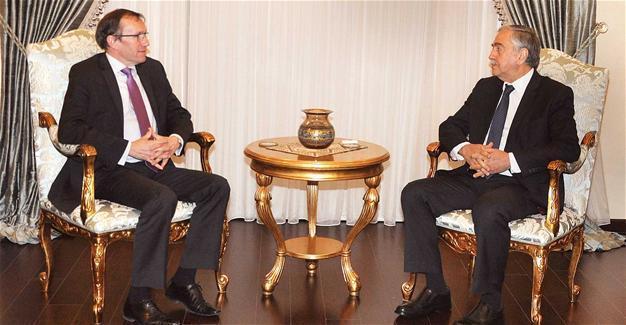Cyprus talks break up over ‘Enosis’ row
NICOSIA
 Peace talks aiming to find a peaceful solution to the more than 40-year-old Cyprus issue collapsed on Feb. 16 over a row between the Turkish and Greek sides stemming from the latter’s recent decision to introduce the commemoration of a vote for “Enosis” in Greek Cypriot public schools.
Peace talks aiming to find a peaceful solution to the more than 40-year-old Cyprus issue collapsed on Feb. 16 over a row between the Turkish and Greek sides stemming from the latter’s recent decision to introduce the commemoration of a vote for “Enosis” in Greek Cypriot public schools. A law recently passed in the south will now permit the celebration of a 1950 referendum, when 96 percent of Greek Cypriots voted for the island to be united with Greece, which is known as “Enosis” in Greek.
Turkish Cypriot leader Mustafa Akıncı said Greek Cypriot President Nicos Anastasiades had walked out of the negotiations when the two leaders met at the U.N. Good Offices in Nicosia under the auspices of U.N. special envoy Espen Barth Eide.
Akıncı said that when the school issue was discussed, Anastasiades said there “was nothing else to say, slammed the door hard and left,” despite Eide’s effort to provide conciliation.
But Anastasiades said it was Akıncı who had left the negotiations table, while also issuing a call to the Turkish Cypriot leader for him to “return to the table.”
Meanwhile, Foreign Minister Mevlüt Çavuşoğlu said the Greek Cypriot side was constantly running away from the table, suggesting that it should return to the table if it wanted to negotiate.
Çavuşoğlu also called the Greek Cypriot parliament’s enosis decision “unacceptable” for Turkey and Turkish Cypriots.
“At that point there was nothing more to do, as this meeting needs to be conducted in an atmosphere of respect, so we also left the meeting,” he told reporters.
Akıncı’s “withdrawal was unwarranted and without cause or reason,” Anastasiades said on television, according to AFP, adding that Eide, chairing the meeting, was also “unaware of what happened.”
Akıncı said that even though they had decided to cancel a technical-level meeting set for Feb. 14 between the negotiators of the two sides because there was no need for technical talks when political discussion were continuing, Akıncı said he attended the leaders’ meeting on Feb. 16 in order to personally express the Turkish Cypriots’ stance regarding the Enosis law to Anastasiades.
Instead of listening to Turkish Cypriots’ stance at the meeting, Anastasiades came to the meeting with a five-page pre-prepared text and read it, Akıncı said.
Akıncı said Anastasiades had told him during the meeting that he did not approve of the Greek Cypriot parliament’s Enosis decision.
“We were waiting for Anastasiades to publicly announce this and then take a step to denounce the law but he did not give us a guarantee or message on this issue,” he said.
The eastern Mediterranean island has been divided since 1974 when Turkish troops intervened in the northern third after a coup aimed at unification with Greece took place.
On Feb. 15, Akıncı penned a letter to U.N. Secretary-General Antonio Guterres, saying the ongoing peace talks process and the efforts to build mutual trust between the two communities on the island would be seriously damage if the law instituting the celebration of Enosis was not repealed. Akıncı urged Guterres to take the initiative to make the Greek Cypriot parliament repeal the decision.
“If the Greek Cypriot parliament does not fix this decision, the negotiation process will be nonsense from now on,” Akıncı told reporters in Nicosia yesterday, state-run Anadolu Agency reported.
The two sides have been engaged in fragile peace talks since May 2015 that observers have described as the best chance in years to reunify the island.
In January, the United Nations hosted talks in Geneva bringing both sides together for the first time with the three “guarantor powers” of Britain, Greece and Turkey.
Much of the progress until now has been based on the strong personal rapport between Anastasiades and Akıncı.
“The Greek [Cypriot] leader has acted from time to time hotheadedly,” said Akıncı on Feb. 16 in reference to Anastasiades leaving the meeting.
“In the past we tolerated it until the last drop. It was not possible to tolerate this now,” he said. “This is [not] a way to behave in a meeting.”
Akıncı also said “the door was open for the situation they created with their hands to be mended by their hands [again].”
















